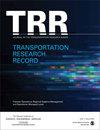发展适应气候变化的交通弹性
IF 1.8
4区 工程技术
Q3 ENGINEERING, CIVIL
引用次数: 0
摘要
尽管弹性的定义范围很广,但它们的最终目标是在可预见和不可预见的中断期间和之后保持功能和性能。交通系统弹性的共同主题包括准备、稳健性、响应和恢复。适应能力越来越被认为是应对高度不确定条件的一种重要的复原能力,而转型能力则是维持可持续性的一种基本能力。本文讨论了促进弹性自适应发展的三个因素:(1)组织及其基础设施系统面对已知和未知威胁的适应能力的发展;(2)动态、自适应和鲁棒性方法在深度不确定条件下的应用;(3)减轻导致或加剧系统功能和性能的不必要中断的因素,以及基于风险的方法来管理具有良好理解的发生可能性和后果的特定威胁。这些因素使一个实体能够在极不确定的条件下适应——随着条件的变化而发展复原力——并适应以遏制破坏的原因。适应性地发展弹性的好处是:能够发展基于威胁和基于机会的弹性;在无法量化中断的机会和后果的情况下,应对深层次的不确定性;从仅仅控制症状到解决导致、影响或延续症状的因素的转变。这些概念被应用于开发交通机构的适应性弹性改进过程。对于有兴趣自适应发展弹性的从业人员,以及对基于风险、适应性和缓解的方法来解决已知和未知威胁感兴趣的研究人员,本文可能对短期和长期弹性收益有用。本文章由计算机程序翻译,如有差异,请以英文原文为准。
Developing Transportation Resilience Adaptively to Climate Change
Although definitions of resilience are wide-ranging, they ultimately aim to preserve functionality and performance during and after anticipated and unanticipated disruptions. Common themes for transportation system resilience include preparedness, robustness, response, and recovery. Adaptation is increasingly considered an important resilience ability for deeply uncertain conditions, and transformation an essential ability for sustainability. This paper discusses three factors that contribute to the development of resilience adaptively: (1) development of adaptive capabilities in an organization and its infrastructure systems to face known and unknown threats; (2) application of dynamic, adaptive, and robustness approaches in deeply uncertain conditions; and (3) mitigation of factors that cause or exacerbate unwanted disruptions to system function and performance—together with risk-based approaches to manage specific threats with well-understood likelihoods and consequences of occurrence. These factors enable an entity to adapt under deeply uncertain conditions—developing resilience as conditions change—and to adapt to curb the causes of disruptions. The benefits of developing resilience adaptively are to: enable the development of both threats-based and opportunities-based resilience; address deep uncertainties where it is impossible to quantify the chances and consequences of disruptions; and transition from merely managing symptoms to addressing the factors that cause, influence, or perpetuate them. These concepts are applied to develop an adaptive resilience improvement process for transportation agencies. This paper is potentially useful to practitioners interested in developing resilience adaptively and to researchers interested in risk-, adaptive and mitigation-based approaches to address known and unknown threats, for short- and long-term resilience gains.
求助全文
通过发布文献求助,成功后即可免费获取论文全文。
去求助
来源期刊

Transportation Research Record
工程技术-工程:土木
CiteScore
3.20
自引率
11.80%
发文量
918
审稿时长
4.2 months
期刊介绍:
Transportation Research Record: Journal of the Transportation Research Board is one of the most cited and prolific transportation journals in the world, offering unparalleled depth and breadth in the coverage of transportation-related topics. The TRR publishes approximately 70 issues annually of outstanding, peer-reviewed papers presenting research findings in policy, planning, administration, economics and financing, operations, construction, design, maintenance, safety, and more, for all modes of transportation. This site provides electronic access to a full compilation of papers since the 1996 series.
 求助内容:
求助内容: 应助结果提醒方式:
应助结果提醒方式:


